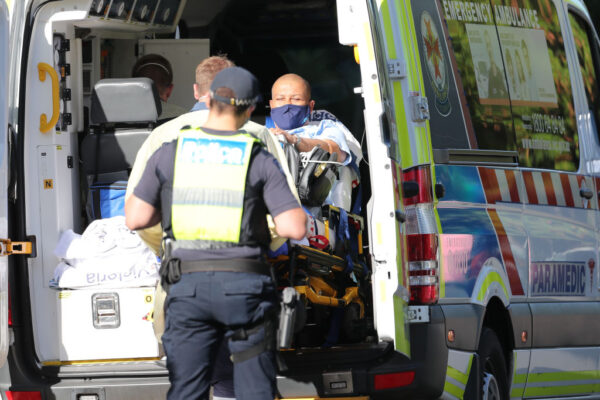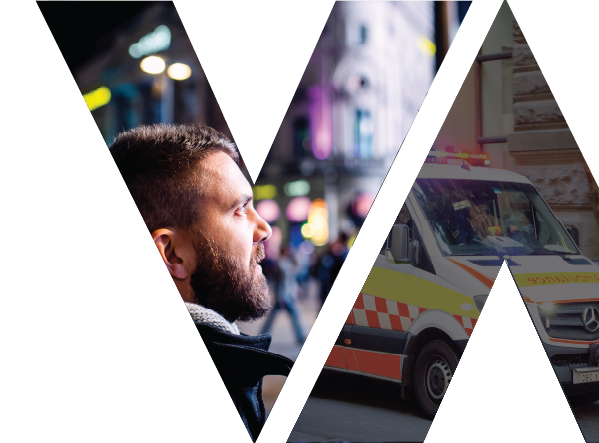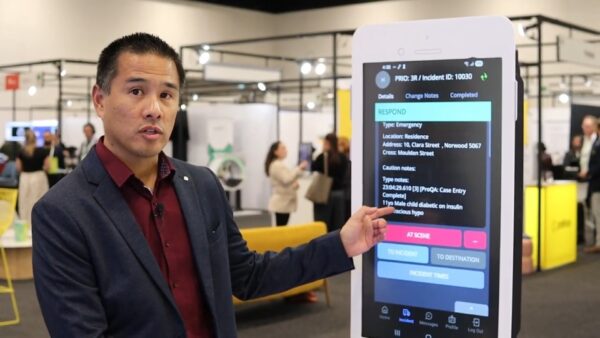Violent incidents are an increasingly frequent reality for first responders. The significant risks these incidents present to the safety and well-being of responders and the impact this has on their families and loved ones can’t be understated.
Rates of violence towards first responders vary, with between 57% and 93% of first responders reportedly experiencing physical and/or verbal violence throughout their career¹. With the ever-increasing demands on service to respond and heightened patient interactions, the problem is unlikely to decrease unless alternate measures are taken.
First responders have reported various forms of violence, including verbal abuse, sexual harassment, assault, stabbing, shooting, and physical altercations². Injuries resulting from violence range from minor injuries (facial injuries, fractures, sprains, contusions, abrasions, lacerations and dislocations) to fatalities³. Perpetrators include patients, their family members and bystanders4. The traumatic nature of violence leads to psychological and emotional distress5, with more severe events correlating with increased rates of Post Traumatic Stress Disorder (PTSD)6.
The shift in societal norms, and the increasing number and variety of reasons that patients can lose the ability to self-regulate, due to medical, trauma, psychosocial or substance misuse, to name a few, are all calls for agencies to change the way that they can prevent and support both reactively and proactively.
Mitigation strategies need to be multilayered, including improving education, situational awareness cameras, body-worn cameras, preventive strategies in the management of substance abuse, promotion of self-defence, and gaining social support. The next layer of control can be preventative, including the capture of evidence to provide context of the incident. To support first responders to help combat this alarming issue, the integration of crew-activated occupational violence cameras within Corvanta’s Critical Communications Hub duress capability emerges as a crucial solution.
In this blog, we shed light on the importance of these cameras and how they support first responders to effectively support their communities while enhancing their safety in both a physical and psychological sense.

Enhancing Safety and Accountability
Violence can occur unexpectedly during emergency response incidents, leaving first responders vulnerable and exposed to physical and verbal assaults. Crew-activated occupational violence cameras serve as an invaluable tool to capture and document such incidents. By providing visual evidence, these cameras not only enable law enforcement authorities to pursue necessary actions but also foster accountability among perpetrators, acting as a powerful deterrent against future acts of violence. Signage in the vehicle also helps those with the cognitive ability to understand that 360-degree cameras are there and to reconsider their actions before the event unfolds.
Real-Time Awareness and Incident Management
The integration of occupational violence cameras into our Critical Communications Hub equips dispatchers and emergency communication (comms) centres with real-time visibility into unfolding incidents. Live streaming and video recording functionalities enable immediate awareness of potentially hazardous situations, allowing for swift response coordination and resource allocation. This enhanced situational awareness empowers comms centres to make informed decisions while ensuring the safety of their ambulance crews.
Supporting Post-Incident Investigations
Following exposure to incidents with violence, comprehensive investigations are essential for legal proceedings and continuous improvement initiatives.
Crew-activated in-vehicle 360 degree cameras capture vital footage that can be used as evidential material during investigations, recording a few seconds before the activation, locally to the cloud or into the comms centres. This evidentiary documentation supports accurate reconstructions of events, aids in identifying assailants, and provides valuable insights for training and procedural enhancements, further bolstering the safety and security of ambulance first responders and increasing the accountability of the offenders.
Protecting the Wellbeing of First Responders
“Occupational violence” or just violence is increasing in frequency and risks present a constant threat in the minds of first responders, eroding their sense of psychological safety. These incidents take a toll on the mental and emotional well-being of first responders.

The presence of crew-activated occupational violence cameras provides reassurance and a sense of security to ambulance crews. Activated only by them and built into the current duress capability they already know and use. Even just knowing that incidents are being recorded and live fed to their agency to improve the reaction times of support resources such as Police or other first responders nearby fosters a safer working environment, alleviating anxieties and enabling responders to focus on their core mission of saving lives.
As we navigate the increasing challenges faced by first responders, ensuring their safety and well-being is paramount. The added layer of duress, hard and soft button integration of crew-activated occupational violence cameras within our Critical Communications Hub system empowers and enables responders to effectively address and combat occupational violence incidents. By fostering increased accountability, enhancing remote situational awareness, supporting investigations and proceedings, and safeguarding the mental well-being of first responders, these cameras play a vital role in creating a safer and more secure environment for those who selflessly serve on the frontlines of emergency response.
[1] Murray et al., 2020 First responder mental health, traumatic events and rural and remote experience – Jones – 2024 – Journal of Advanced Nursing – Wiley Online Library
[2] Murray et al., 2020 First responder mental health, traumatic events and rural and remote experience – Jones – 2024 – Journal of Advanced Nursing – Wiley Online Library
[3] Murray et al., 2020 First responder mental health, traumatic events and rural and remote experience – Jones – 2024 – Journal of Advanced Nursing – Wiley Online Library
[4] Murray et al., 2020 First responder mental health, traumatic events and rural and remote experience – Jones – 2024 – Journal of Advanced Nursing – Wiley Online Library
[5] Jones et al. 2022., “Complexity, safety and challenges: Emergency responders’ experience of people affected by methamphetamines” – Jones – 2022 – Nursing & Health Sciences – Wiley Online Library
[6] Jones, 2017 Describing the Mental Health Profile of First Responders: A Systematic Review – Sara Jones, 2017 (sagepub.com)



